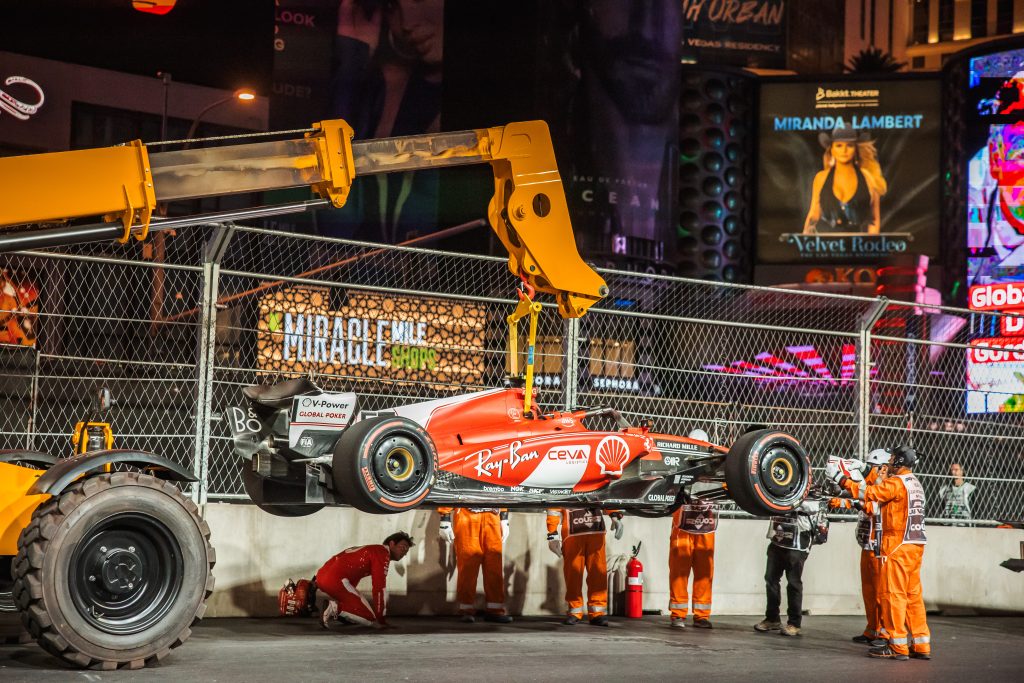

The opening practice session for the long-awaited event in November around the streets of Sin City had to be red-flagged after just eight minutes due to Sainz’s Ferrari sustaining severe damage after driving over a water valve cover.
Significantly, the power unit was impacted, leading to a replacement energy store that resulted in the FIA being forced to impose a 10-place grid penalty on Sainz for exceeding the season’s quota.
After qualifying second for the race, albeit demoted to 12th, Sainz vented his anger, citing there was a clear safety issue with the track that “destroyed” his car, incurring a penalty that was neither his fault nor that of the team.
With no facility within the regulations to accept force majeure, the stewards were left with no choice but to reluctantly impose the grid drop.
Mercedes team principal Wolff believes the penalty was “absolutely unfair”, and that the regulations need to be reviewed at the next F1 Commission meeting due to take place on the eve of the new season.
“For me, as a racer, I am the first one to say that he didn’t deserve the outcome,” said Wolff, speaking to select media, including Speedcafe, in Abu Dhabi.
“I think we should look at the rules. Force majeure is a difficult one. What happens with kerb strikes (and) you destroy your car by riding over a kerb? There’s nothing you can do.
“You’re riding over bumps with cold tyres like happened to Lando (Norris during the Las Vegas GP), and you smash into a wall? Are people going to say this is a force majeure event?
“What if another car T-bones you and you’ve done nothing? Is that force majeure? As a sportsman, nobody liked the situation.
“It was unjust what happened to him and it ruined the race weekend for him that he maybe could have won, so we’ve got to look and give it a hard think how we can change it.”
The suggestion at the time was that eight of Ferrari’s nine rival teams were prepared to sign off on a unique decision that would have allowed Sainz to race without penalty.
The belief was that with Mercedes battling Ferrari for second in the constructors’ championship at that stage, and the associated difference in revenue between finishing runner-up and third, Wolff was the dissenter, a claim denied by Mercedes.
While Wolff felt for Sainz and the situation the Spanish driver was caught up in, as a team principal, and with a duty of care to his team, he insists that ultimately the right decision was made.
“As a team principal for a rival team that is fighting for P2, I need to look at the regulations and the full scope of possible actions of ourselves to finish P2 in the championship,” said Wolff.
“If the regulation says so, I need to act for the benefit of the team and the 2,500 people who will have a very big difference in bonus between P2 and P3, to act to the limit of the regulations.
“Because if we lose the championship by five points because I acted in sporting fairness, and the rules would have allowed me to penalise the car – whatever driver – I need to do this.
“But I have 2,500 people that I’m responsible for, that pay mortgages and school fees, so it’s a no-brainer. I think it’s important that sometimes we put ourselves in the other’s position.
“I did that for Carlos and it’s awful. The other way around, I’m not sure whether the exercise was done.”
Wolff recognises, though, that even if future discussions do take place, trying to make changes will be “super difficult” based on the possibility of there being numerous grey areas as to what could constitute force majeure.
Wolff initially referenced Lewis Hamilton’s disqualification from second place in the United States Grand Prix for excessive skid wear, seemingly caused by the excessive bumpiness of the Circuit of the Americas.
“Our plank disqualification, we could say the bumps were much more than we expected and we couldn’t change it,” he said.
“It was a sprint weekend, it’s force majeure, and we come up with all kinds of measurements that the bumps are higher than expected.
“But, for me, it’s more like things you can’t (control). For me, riding the kerb and destroying your skids and falling foul of the regulations, striking a bird – unfair, but we haven’t found regulations that would cover these things.”
Concluding with Sainz, Wolff said: “I think hitting a drain cover and ruining your car is unfair for the driver, definitely.”



















Discussion about this post